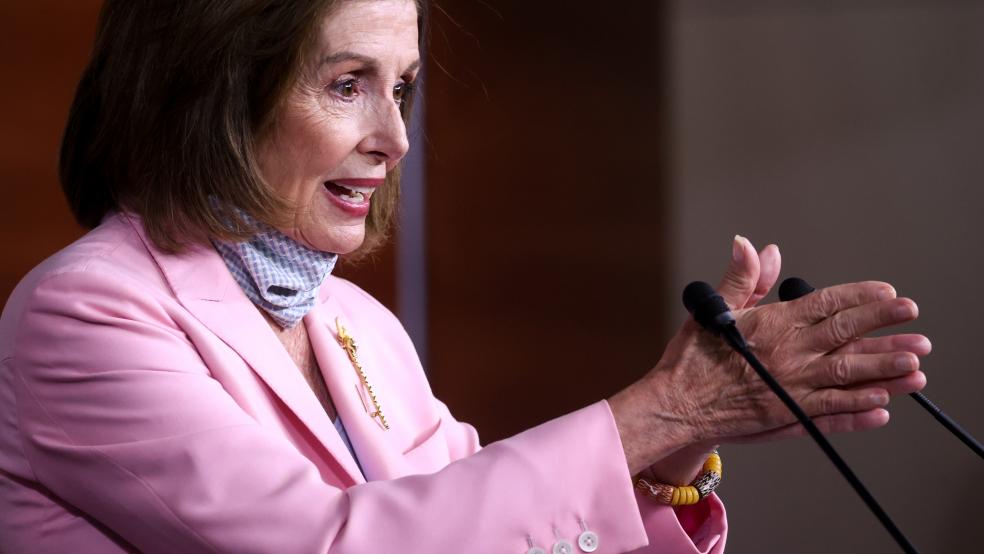Speaker Nancy Pelosi on Wednesday celebrated the House’s approval a day earlier of Democrats’ $3.5 trillion budget framework — and downplayed some elements of the deal she struck to get all Democrats on board.
"It's a wonderful morning. We had such a good day in the Congress yesterday,” Pelosi told reporters at her weekly press conference. “I want to salute my caucus for the commitment to values that they demonstrated in accepting the president’s budget, the Build Back Better initiative. Again, it was a team effort for us to win the vote.”
For a while, though, it was far from certain that all of Pelosi’s team would stick together, as a group of moderate Democrats threatened to withhold their support for the budget blueprint unless the House first voted on the infrastructure bill.
The deal Pelosi made to secure the moderates’ votes included setting a September 27 deadline for a vote on the $1 trillion bipartisan infrastructure bill already passed by the Senate. Pelosi said that concession was just a “clarification” of the timeframe since surface transportation program authorizations expire at the end of next month and an infrastructure vote would have been needed by then anyway. "So, we're talking about a couple of days earlier," Pelosi said, adding that the moderates’ participation was “constructive.”
Pelosi wants the $3.5 trillion sending package paid for: Pelosi told reporters that her goal is to have all committees reporting their individual portions of the budget package by September 15. She added that she wants to see the entire cost of the legislation covered. “I’d like to have it totally paid for. We’ll see what is possible,” she said. Other Democrats have suggested that their spending plans may not be fully offset.
Schumer says infrastructure and budget plans will meet most of President Biden’s emissions goals: In a letter to Senate colleagues, Senate Majority Leader Chuck Schumer (D-NY) said that an analysis by his office shows that the two pieces of legislation together would put the U.S. on track to reduce carbon emissions to about 45% of 2005 levels by 2030. Read more at Axios.
Centrists say they got what they wanted: "With roads and bridges crumbling across our nation, this agreement does what we set out to do: secure a standalone vote for the bipartisan infrastructure bill, send it to the president’s desk, and then separately consider the reconciliation package," the centrists led by Rep. Josh Gottheimer (D-NJ) said in a joint statement on Tuesday. “We have established a path forward that ensures we can pass this once-in-a-century infrastructure investment by September 27th, allowing us to create millions of jobs and bring our nation into the 21st century. It will receive standalone consideration, fully delinked, and on its own merits.”
Progressives say there’s no “delinking": Rep. Pramila Jayapal (D-WA), chair of the Congressional Progressive Caucus, said the bipartisan infrastructure bill and the larger spending package were still linked as far as her caucus is concerned. “As our members have made clear for three months, the two are integrally tied together, and we will only vote for the infrastructure bill after passing the reconciliation bill,” she said in a statement.
Why the moderate holdouts may have been so SALTy: “It seems the nine members obstructed the caucus to obtain leverage in crafting the reconciliation package to junk the $10,000 limit on state and local tax (SALT) deductions,” writes Washington Post Columnist Jennifer Rubin. “If so, they suffer from political tone-deafness, as the deductions primarily help wealthy homeowners in blue states. At a time when Democrats are contrasting their support for working- and middle-class Americans with the GOP’s defense of wealthy scofflaws, and when Democrats are searching for more revenue, restoring the SALT deductions was not going to happen.”
So maybe nobody won: “Pelosi managed to keep her party from falling apart at a crucial moment, and that’s about all. Moderates still can’t point to passage of the bipartisan infrastructure bill, and progressives are angry that they’ve lost leverage to pass a sprawling social spending package,” Jeff Greenfield writes at Politico.
“The agreement has to be accorded some level of respect, since it keeps alive the possibility of victory for President Joe Biden’s agenda. But what it really shows, besides Pelosi’s deftness, is just how far Democrats are from a coherent governing force. Particularly with a huge trust deficit between the party’s factions, the struggle between the left and center could still derail Democrats’ best shot at a set of accomplishments to buoy them in 2022 and beyond.”
September is going to be rough: The calendar will be packed and the prospects for another intraparty clash over the infrastructure and budget bills are quite high given that trust levels between moderates and progressives are quite low. The budget package may not be ready by the September 27 deadline for an infrastructure vote. Progressives will worry that moderates will bail on the reconciliation package if the infrastructure bill is approved separately.
That will pose another challenge for Pelosi. Biden on Tuesday praised her leadership as “masterful.” She may have to demonstrate that mastery again, working with the Senate on the reconciliation package as well, as Democrats set up the timing of their votes in both chambers.
Tuesday’s vote sets up a debt-ceiling showdown: Punchbowl News reports that Tuesday’s vote “made it official -- there’s going to be a partisan showdown over government funding and the debt limit this fall. We all know it’s coming, but the rule included language preventing a clean vote on a separate resolution raising the debt limit. Democrats are now expected to pair a debt-limit increase next month with a continuing resolution to keep federal agencies open beyond Sept. 30, which is when government funding runs out.”
The bottom line: Democrats took a big step Tuesday toward enacting President Biden’s economic agenda, but they’re nowhere near done yet.
Budget
Pelosi vs. the Renegades: Who Won Dems' Big Budget Deal?

JONATHAN ERNST/REUTERS




